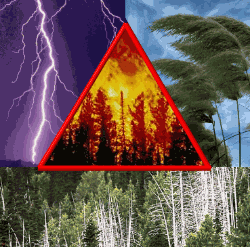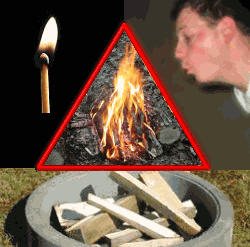
What's a Fire?
Components of Fire

FIRE
, you need to have Three Key Elements:FUEL
- something to burn, such as wood, paper, grass, or clothing.AIR
- actually oxygen is needed, but that's part of the air.HEAT
- a catalyst to start the fuel and oxygen combustion.
fire triangle
image above, a forest is the fuel, gusts of wind provide the air, and a lightning strike supplies the heat. This results in a blazing forest fire.For our campfires, we use the exact same elements but hopefully on a much smaller scale. Sticks and branches for fuel, your breath for air, and a match for heat - Presto!

If any one of the three elements is missing (or is purposely removed) the fire will go out. For example, pouring water on a fire removes the HEAT - there is still plenty of fuel and lots of oxygen, but the water reduces the temperature so much the fire sputters out. Read about extinguishing fires later.
Common Mistakes
When building a fire, you've got to keep FUEL, AIR, & HEAT in mind at all times. The most trouble people have in getting fires started is forgetting the importance of all three working together. And, the most common problem is not enough AIR. This shows up in two ways:
- Big Wood - you need tiny slivers of wood to start because there is lots of air space around them. Big chunks of wood do not allow air to reach the fuel.
- Flat Fire - stacking the small sticks of wood flat instead of standing them up with air space between.
Other common blunders are not paying attention to the wind direction and burning up your wood supply too fast, but you can read more about all that on the fire lighting page. Just remember the fire triangle - if you have adequate fuel, air, and heat, you'll have a fire and by regulating any of those three elements, you control your fire.
Fire Tetrahedron
This fire triangle is also known as a fire tetrahedron, but that just doesn't roll off your tongue too well. And, for practical purposes, the 4th side of the fire tetrahedron does not pertain to campfires. It is Chemical Reaction, that is the chemical changes that occur during combustion. As far as campfires and other wood-burning fires go, we have control over fuel, air, and heat, but not the chemical reaction - it just happens.
Find more Campfire Resources at CampfireDude.com


Recent Comments